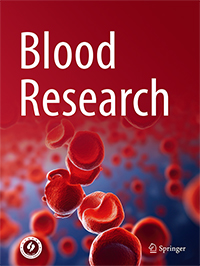Review Article
 Split Viewer
Split Viewer
Blood Res 2021; 56(S1):
Published online April 30, 2021
https://doi.org/10.5045/br.2021.2021032
© The Korean Society of Hematology
Immuno-oncology for B-cell lymphomas
Correspondence to : Yoon Seok Choi, M.D., Ph.D.
Department of Hematology-Oncology, Ajou University School of Medicine, 164, World cup-ro, Yeongtong-gu, Suwon 16499, Korea
E-mail: wyfran@ajou.ac.kr
*This study was supported by a grant from National Research Foundation Grant (NRF-2018R1C1B6008261).
This is an Open Access article distributed under the terms of the Creative Commons Attribution Non-Commercial License (http://creativecommons.org/licenses/by-nc/4.0) which permits unrestricted non-commercial use, distribution, and reproduction in any medium, provided the original work is properly cited.
The goal of cancer immunotherapy is to restore and optimize the immune response against malignant clones through several stages, from recognition of tumor antigens to establishment of long-lived memory cell populations. Boosting the intrinsic anti-tumor immune responses of the patients’ own, several types of “active immunotherapies” have been tried in many types of malignancies, inspired by successful experiences of immune checkpoint inhibition even in Hodgkin lymphoma. However, in B-cell non-Hodgkin lymphomas, clinical usefulness of such “active immunotherapies” is relatively unsatisfactory considering the remarkable advances in “passive immunotherapy,” including CD19-targeting chimeric antigen receptor T-cell therapy. Understanding how tumor cells and immune cells interact and contribute to immune evasion processes in the tumor microenvironment (TME) is an important prerequisite for the successful restoration of anti-tumor immune responses. In this review, a recent understanding of the biology of the immune tumor microenvironment surrounding B-cell non-Hodgkin lymphomas will be introduced. In addition, novel therapeutic approaches targeting the immune microenvironment other than immune checkpoint blockade are discussed.
Keywords Lymphoma, T cell, Regulatory T cell, Immunotherapy, Vaccine
Article
Review Article
Blood Res 2021; 56(S1): S70-S74
Published online April 30, 2021 https://doi.org/10.5045/br.2021.2021032
Copyright © The Korean Society of Hematology.
Immuno-oncology for B-cell lymphomas
Yoon Seok Choi
Department of Hematology-Oncology, Ajou University School of Medicine, Suwon, Korea
Correspondence to:Yoon Seok Choi, M.D., Ph.D.
Department of Hematology-Oncology, Ajou University School of Medicine, 164, World cup-ro, Yeongtong-gu, Suwon 16499, Korea
E-mail: wyfran@ajou.ac.kr
*This study was supported by a grant from National Research Foundation Grant (NRF-2018R1C1B6008261).
This is an Open Access article distributed under the terms of the Creative Commons Attribution Non-Commercial License (http://creativecommons.org/licenses/by-nc/4.0) which permits unrestricted non-commercial use, distribution, and reproduction in any medium, provided the original work is properly cited.
Abstract
The goal of cancer immunotherapy is to restore and optimize the immune response against malignant clones through several stages, from recognition of tumor antigens to establishment of long-lived memory cell populations. Boosting the intrinsic anti-tumor immune responses of the patients’ own, several types of “active immunotherapies” have been tried in many types of malignancies, inspired by successful experiences of immune checkpoint inhibition even in Hodgkin lymphoma. However, in B-cell non-Hodgkin lymphomas, clinical usefulness of such “active immunotherapies” is relatively unsatisfactory considering the remarkable advances in “passive immunotherapy,” including CD19-targeting chimeric antigen receptor T-cell therapy. Understanding how tumor cells and immune cells interact and contribute to immune evasion processes in the tumor microenvironment (TME) is an important prerequisite for the successful restoration of anti-tumor immune responses. In this review, a recent understanding of the biology of the immune tumor microenvironment surrounding B-cell non-Hodgkin lymphomas will be introduced. In addition, novel therapeutic approaches targeting the immune microenvironment other than immune checkpoint blockade are discussed.
Keywords: Lymphoma, T cell, Regulatory T cell, Immunotherapy, Vaccine

Article Tools
Stats or Metrics
Related articles in BR
-
A Case of a Synchronous Peripheral T-cell Lymphoma in a Patient with Systemic Lupus Erythematosus
Hea Jung Sung, Kwang Il Seo, Ji Hyung Hong, Sang Young Roh, Young Seon Hong, Yoon Ho Ko
Korean J Hematol 2009; 44(4): 273-277 -
Peripheral T-cell lymphoma, NOS in bone marrow and heart
Hye Won Lee and Ja Young Lee
Blood Res 2024; 59(): -
Genomic technologies for detecting structural variations in hematologic malignancies
Mi‑Ae Jang
Blood Res 2024; 59():




 PDF
PDF Standard view
Standard view Export citation
Export citation Share
Share  Previous Article
Previous Article



